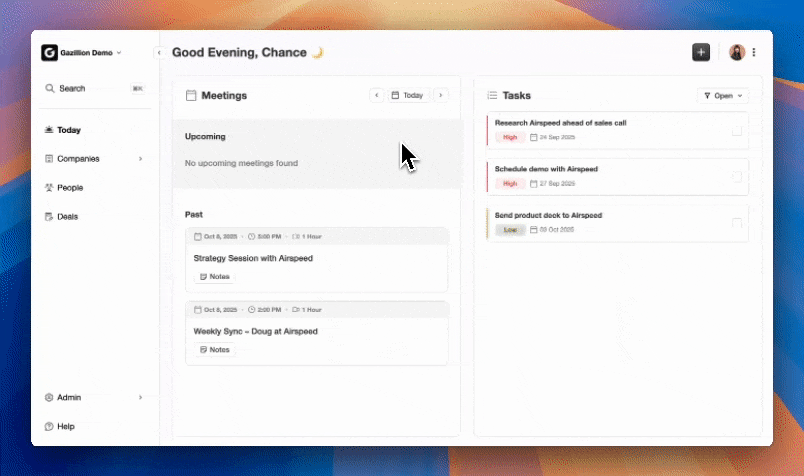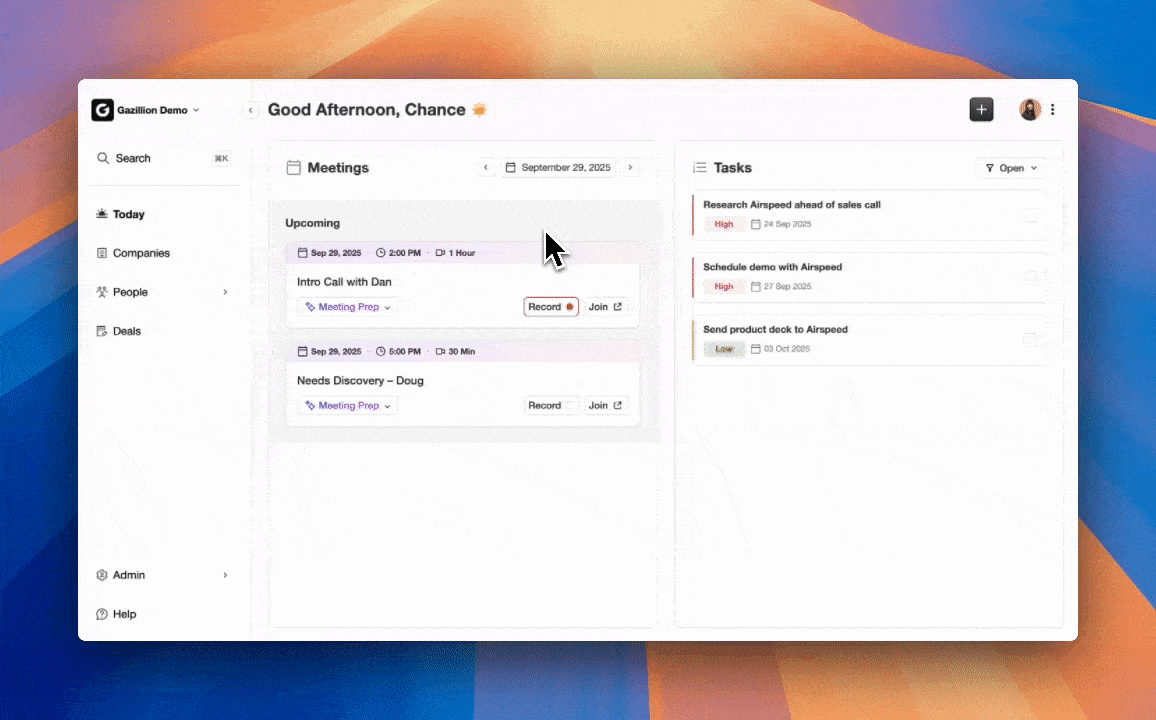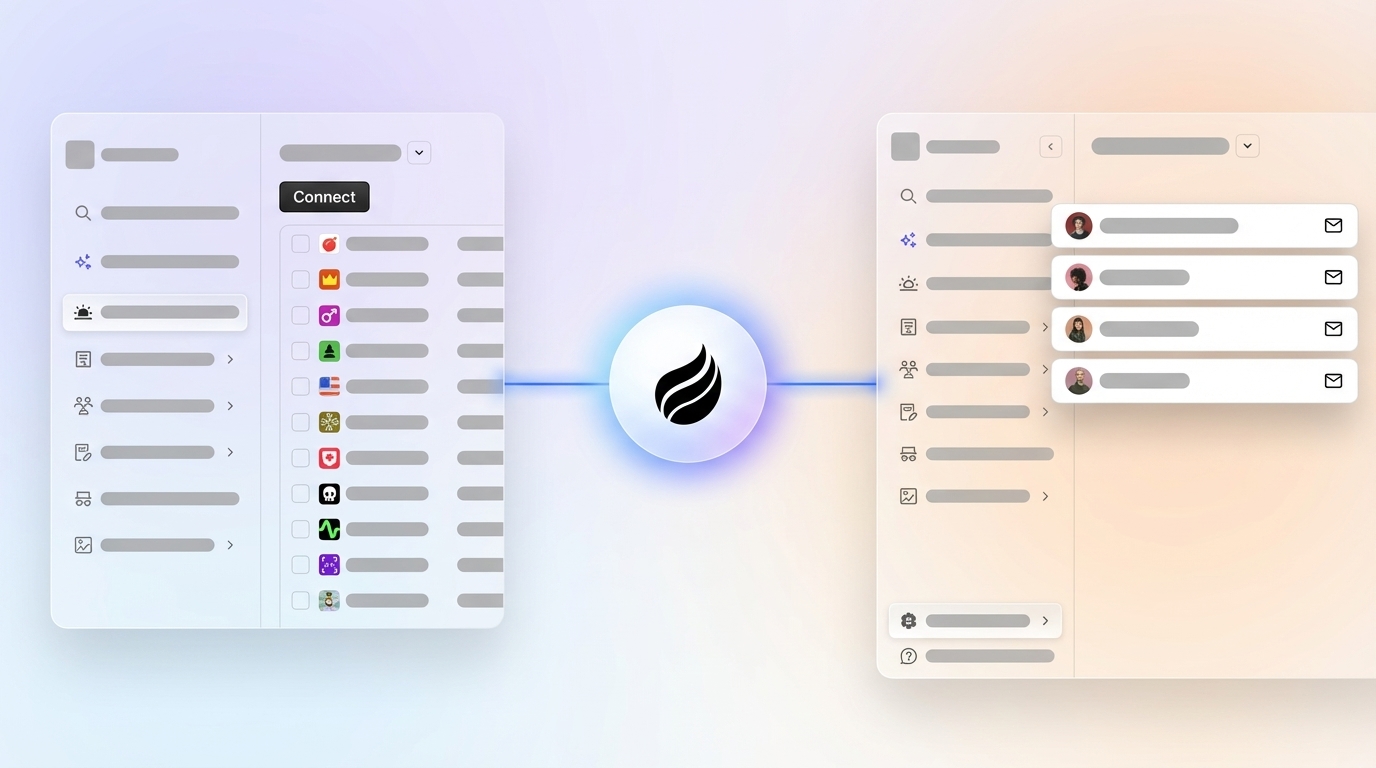Key Takeaways
- Manual data entry, fragmented tools, and legacy CRMs still slow down sales teams in 2026 and reduce time available for real selling.
- AI sales assistants improve productivity by automating data capture, meeting workflows, and pipeline visibility, so leaders can coach and forecast instead of chasing updates.
- Choosing tools that integrate well with your CRM and workflows helps avoid shadow CRMs and improves data quality across the entire revenue team.
- Different AI tools specialize in areas like conversation intelligence, sales engagement, email coaching, and prospecting, so stacking the right mix matters.
- Coffee uses an AI agent to automate CRM updates, meetings, and prospecting; you can view plans and pricing at Coffee.
Why Legacy CRMs and Manual Tasks Are Harming Your Sales Productivity
Revenue teams in 2026 still lose large blocks of time to admin work instead of selling. Internal data from Coffee indicates that manual data entry can consume more than 70 percent of a rep’s week.
Fragmented tools add even more drag. Data often lives across platforms like HubSpot, ZoomInfo, SalesLoft, and call recording tools, which pushes reps toward private spreadsheets and notes. These shadow CRMs make forecasting unreliable and hide real pipeline risk.
Legacy systems, including Salesforce and some all-in-one marketing CRMs, rely on older architectures that struggle with unstructured data, such as emails and call transcripts. Key context can disappear when fields are overwritten, which frustrates users and reduces adoption. The result is low-quality data, expensive tech stacks, and leaders who spend more time questioning reports than coaching teams.
How AI Sales Assistants Transform Sales Operations
AI sales assistants shift sales teams from administrative work to higher-value conversations. The most effective tools focus on four main areas.
Automated data capture and enrichment remove the need for manual creation of contacts, companies, and activities. These tools pull in emails, calendar events, and external firmographic data so reps start their day with accurate records and cleaner pipelines.
Intelligent meeting management supports every stage of the call. Reps receive pre-call briefs, meetings are recorded and transcribed, and follow-up summaries or emails are drafted automatically so next steps do not slip.
Proactive pipeline intelligence surfaces changes without spreadsheet exports. Leaders can see which deals moved, stalled, or were created since last week, which supports more focused one-on-ones and clearer forecasts.
Consolidated tech stacks reduce context switching and license costs. A single AI agent that handles data capture, meeting support, and reporting often replaces several point solutions and helps keep one true system of record.
Coffee: The AI Agent That Autonomously Powers Sales Growth
Coffee is an agent-led platform built to fix the data and workflow problems of traditional CRMs. Teams can use Coffee as a standalone AI-first CRM or as a companion layer on top of Salesforce or HubSpot.
Autonomous data entry and enrichment keep records complete without manual input. Coffee scans emails and calendars, creates contacts, companies, and activities, and enriches them with data such as titles, funding, and LinkedIn profiles through licensed data partners. Separate enrichment tools often become unnecessary.

AI-powered meeting orchestration acts like an executive assistant for every rep. The Today page prepares briefings on attendees and past activity, Coffee joins calls to record and transcribe, and then produces summaries, next steps, and draft follow-up emails for quick review.

Advanced pipeline intelligence with the Compare feature gives teams a weekly view of movements in the funnel. Coffee highlights new opportunities, progressed stages, and stalled deals, which turns pipeline reviews into focused working sessions instead of manual reporting.
The natural language List Builder accelerates prospecting. Reps can request lists such as “VPs of Sales in North America at companies with more than 10 million dollars in funding using Salesforce,” and Coffee builds a targeted list from its integrated enrichment data.

Sales teams that delegate admin work to Coffee turn their CRM into a system reps want to use. Data quality improves, meetings stay on track, and managers gain a clearer view of the business. To review plans, visit Coffee pricing.
The Top 10 Best AI Sales Assistants in 2026
The tools below support different parts of the sales workflow, from prospecting to coaching to reporting.
1. Coffee: Agent-led CRM and companion app for autonomous data capture
Coffee automates CRM hygiene, meeting workflows, and pipeline intelligence while working as either the primary CRM or an intelligent layer on top of Salesforce or HubSpot. Teams use it to cut manual admin, reduce tool sprawl, and keep one accurate system of record.
2. Otter SDR Agent: Always-on AI sales representative
Otter SDR Agent serves as a digital rep that delivers product demos, answers questions, and guides visitors on your site at any time of day. Teams rely on it to qualify interest and route warm leads faster.
3. Claygent (Clay’s Agent): Hyper-personalized prospecting and research
Claygent uses models such as GPT-4 and more than 75 external data sources to research accounts and contacts at scale. Teams generate detailed prospect lists and personalization points that would otherwise require hours of manual work.
4. Winn.ai: Real-time call coaching and CRM sync
Winn.ai runs alongside calls, captures notes, and updates up to 25 CRM fields automatically. Reps finish meetings with organized outcomes and minimal follow-up data entry.
5. Gong: Conversation intelligence for sales calls
Gong records, transcribes, and analyzes calls to reveal patterns in customer reactions, deal risk, and rep behavior. Leaders use these insights for targeted coaching and more accurate pipeline assessments.
6. Outreach: Enterprise sales engagement automation
Outreach provides multichannel cadences, activity tracking, and workflow automation for large outbound teams. The platform helps standardize sequences, measure performance, and keep reps on task in complex sales cycles.
7. Lavender: Real-time email coaching
Lavender scores and coaches sales emails as reps write them, focusing on clarity, tone, and structure. Teams adopt it to improve reply rates and reduce time spent drafting outreach.
8. Salesforce Sales Cloud Einstein: AI features inside Salesforce
Salesforce Einstein adds predictive lead scoring, opportunity insights, and automated data capture to existing Salesforce instances. Sales organizations that already use Salesforce often adopt Einstein to gain AI support without changing systems.
9. Apollo.io: Email sequences and prospecting database
Apollo.io combines a large contact database with email sequencing, AI-assisted copy, and inbox warmup. Reps can discover new prospects and launch outbound campaigns from one interface.
10. WotNot: AI chatbots for lead generation and qualification
WotNot offers no-code chatbots that qualify leads, schedule meetings, and work across web and messaging channels. Integration with CRMs like Salesforce and HubSpot keeps captured data aligned with the rest of the funnel.
Comparison Table: Key Capabilities of Top AI Sales Assistants
|
Feature / Tool |
Coffee (Agent-Led CRM) |
Otter SDR Agent |
Claygent (Clay) |
Winn.ai |
|
Automated Data Entry |
Yes (autonomous, full data capture) |
No |
Partial (research automation) |
Yes (auto notes, 25 CRM fields) |
|
AI Meeting Management |
Yes (briefings, summaries, follow-ups) |
Yes (real-time demos, Q&A) |
No |
Yes (real-time call copilot) |
|
Pipeline Intelligence |
Yes (Compare feature, automated tracking) |
No |
No |
No |
|
Lead Database/Enrichment |
Yes (built-in licensed enrichment) |
No |
Yes (75 plus sources aggregation) |
No |
Teams that want to shift more time from admin to selling can review Coffee’s agent-led capabilities and pricing at Coffee.
Frequently Asked Questions
How do AI sales assistants handle data security and privacy?
Most established AI sales tools, including Coffee, follow frameworks such as SOC 2 Type 2 and GDPR. These programs define how data is stored, processed, and retained, and they prevent client data from training public models. Security documentation and audits give buyers clearer visibility into how tools protect sensitive customer records.
Can an AI sales assistant replace a human sales rep?
AI assistants support, but do not replace, human sellers. These tools take over repetitive tasks such as data entry, meeting logistics, and initial research, while people focus on discovery, negotiation, and relationship building. Coffee positions the CRM as a co-pilot that amplifies rep performance rather than substituting for it.
How do AI sales assistants integrate with existing CRMs like Salesforce or HubSpot?
Many AI tools, including the Coffee Companion App, connect directly to major CRMs. After a simple authentication process, the assistant syncs activities, enriches records, and writes notes or summaries back to the CRM, which keeps data consistent without forcing reps to change their primary workspace.
Conclusion: Empower Your Sales Team with the Right AI Assistant
AI sales assistants have become a core part of competitive sales teams in 2026. The right mix of tools reduces manual work, improves data quality, and gives leaders a more accurate picture of pipeline health.
Coffee stands out for teams that want an agent-led system of record or a modern layer on top of Salesforce or HubSpot. By automating data capture, meeting workflows, and pipeline analysis, Coffee helps sales professionals spend more time with customers and less time in spreadsheets.
Teams ready to move from manual data entry to agent-driven workflows can explore plans and get started at Coffee.
